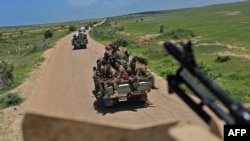In an exclusive interview on Jan. 26 with VOA Somali, Hussein Sheikh-Ali said Somalia has sent 3,000 soldiers each to Eritrea and Uganda in the past few weeks with an additional 6,000 recruits to be sent to Ethiopia and Egypt.
"We want to complete making 15,000 soldiers ready within 2023," Ali told VOA in the one-on-one interview in Washington where he met with U.S. officials to seek more support for Somalia.
The news comes as a report by the Mogadishu-based think tank Heritage Institute for Political Studies (HIPS) cast doubt that the government will meet its December 2024 deadline to have 24,000 soldiers ready to assume security responsibilities when troops from the African Transitional Mission in Somalia (ATMIS) are scheduled to leave.
"This timetable is ambitious because the Somali security services are unlikely to be fully autonomous by then, nor is it likely that al-Shabab will have been militarily defeated," the report said.
"The deadline and the fact the army is in a war while at the same time they are being rebuilt … we argue it's a tight deadline," said Afyare Elmi, executive director of HIPS and the report's coauthor. "It will be difficult to meet."
The report noted that in November, the Somali government asked ATMIS to delay the first drawdown of 2,000 soldiers by six months, from December 2022 to June 30, 2023.
Ali said the delay was requested because the troops Somalia is expecting to take over from ATMIS are in training abroad. He also said the government doesn't want to disrupt military operations against al-Shabab in central Somalia, as the areas ATMIS troops would vacate will have to be taken over by Somali forces.
The Somali government recently brought home most of the 5,000 soldiers who were trained in Eritrea. Ali defended the decision to send more recruits there, calling the plan "transparent." He said the government is ahead of its training schedule.
He said the government will have 24,000 troops trained and fully equipped by next year.
"There is no reason for ATMIS to stay or to continue to stay in Somalia," he added.
Ali also made a bold prediction that the government will defeat the militant group by next summer.
"Our ... primary goal is that in the summer of 2024, before June or July, that there will be no al-Shabab person occupying a territory in Somalia. You can note that down," he said.
The Somali army, working with local clan militia, succeeded in taking several towns and villages in central Somalia from al-Shabab in 2022.
Despite these successes, Somali security forces have other challenges, including financial constraints, and capability and training gaps, the HIPS report said.
The report said Somali army units trained by the United States are now "reasonably well equipped," but the regular army units are only marginally better equipped than the local clan militias supporting government forces.
The report also highlights struggles in generating and deploying "hold" forces that can stabilize newly recaptured areas.
"There is an important difference between pushing al-Shabab forces out of areas and holding them long enough to deliver a real peace dividend to the local inhabitants," it said.
The report further said al-Shabab made stabilization efforts much harder by destroying schools, medical facilities, wells and other important infrastructure.
Security and intelligence experts say it's the responsibility of other government agencies such as police, intelligence and regional paramilitary forces to relieve the army in stabilizing recovered territories.
"To hold the areas seized, to defend themselves and to go forward and seize more territory is difficult for them, both quantity and quality," said Brigadier General Abdi Hassan Hussein, a former intelligence officer and former police commander of Puntland region.
Hussein said the capacity of Somali soldiers has been affected by a decades-long international weapons embargo on Somalia. He said the United Nations and other stakeholders must look into the issue.
The Somali government announced that President Hassan Sheikh Mohamud is hosting the heads of states from the "front-line" countries of Kenya, Ethiopia and Djibouti this week to discuss the war against al-Shabab.
Defense ministers and army chiefs from the four countries met in Mogadishu on Tuesday ahead of Wednesday's summit.









